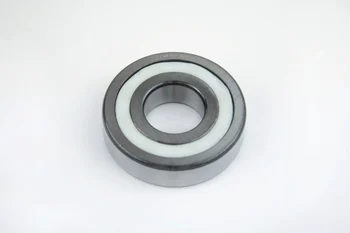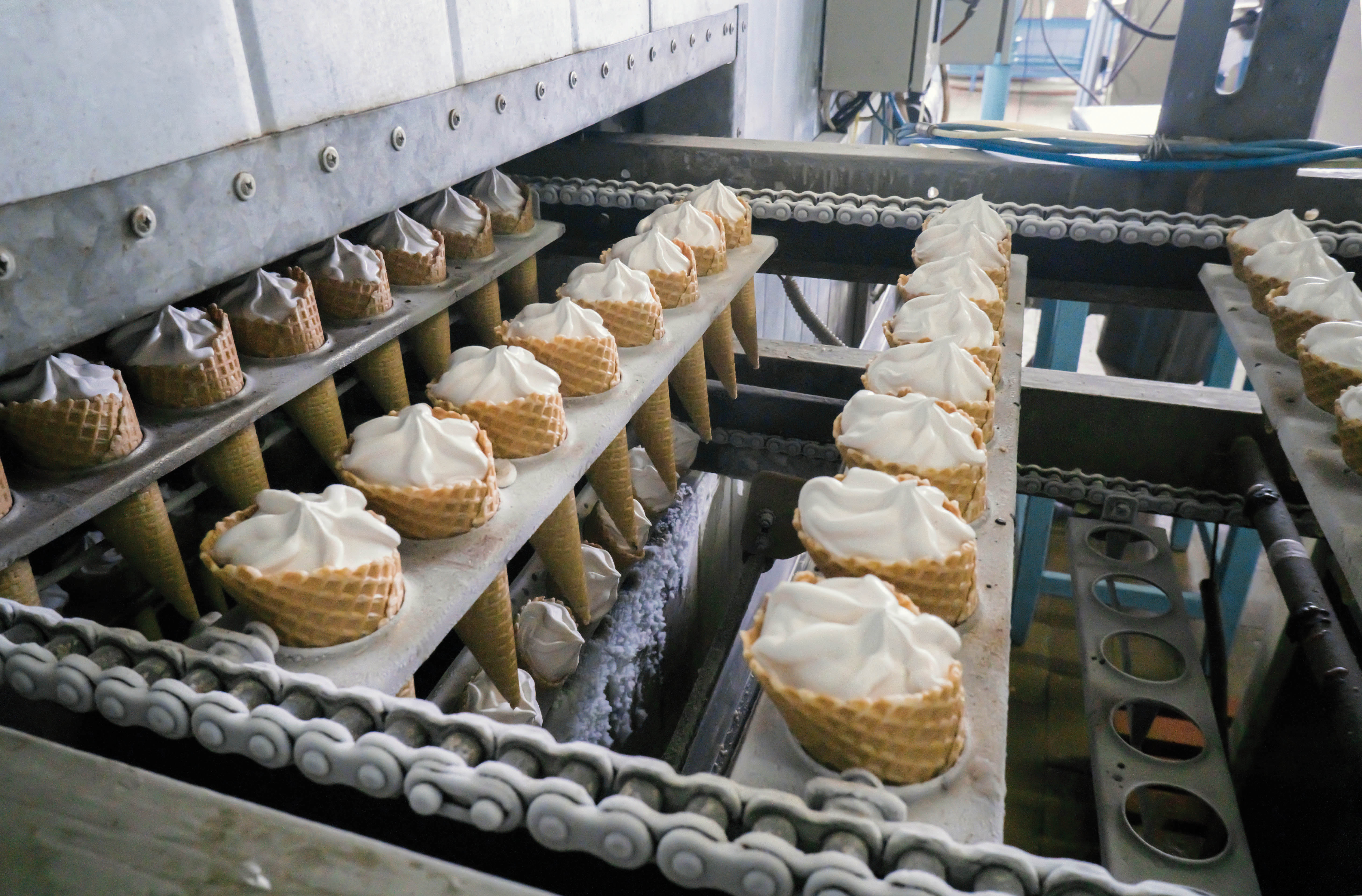While you might guess that a steel mill or rock quarry presents the steepest challenge to reliable machine operation, the reality is that food and beverage plants rank among the toughest environments for rolling element bearings.
Often, severe operating and sanitizing conditions put processing equipment at constant risk of mechanical component issues, particularly in two scenarios:
- Where processes with stringent hygiene requirements demand that equipment undergo daily, aggressive washdown using a combination of high-temperature and high-pressure water jets, caustic and acidic chemicals, as well as chlorine-based sanitizers (conditions typically seen in meat, dairy and ready-to-eat products manufacturing).
- Where baking processes necessitate high temperatures up to 600°C (conditions typical of oven applications).
In both cases, the bearing lubricant performance—a key factor in achieving optimal life from your bearings—is at risk.
The function of the lubricant is to create a thin oil film separating the bearing rolling elements and raceway surfaces in order to reduce friction and wear, thus increasing fatigue life. In most food and beverage applications, a food-grade grease is used to keep roller bearings and bearing housed units (also called mounted bearings) properly lubricated. However, washdown events and extreme high temperatures can severely impact the performance of grease. Consider that:
- Washdown can lead to ingress of water-based detergents and sanitizers that alters the chemical properties of the grease by diluting the base oil and degrading the thickener.
- High temperatures accelerate the oxidation of the oil contained in grease, thereby reducing its effectiveness and useful life.
Periodic relubrication to replenish bearings with fresh grease is a common remedy to these problems. Relubrication frequency will vary depending on the application and the plant’s maintenance practices. In some instances, re-greasing is a daily event. Nevertheless, this solution causes several issues:
- Food safety hazard: Be aware that old grease is likely to purge through the seals of your bearings as new grease is added over time, creating a contamination threat. Many plants use bearing end covers to guard against leaks, but grease and water can accumulate inside these protective caps, creating ideal conditions for bacteria to harbor and develop.
- Equipment downtime: When bearings must be re-lubricated, when grease spills must be attended to and when bearings fail to reach their target service life and must be replaced, this significantly affects equipment uptime more than many plant operators realize.
- Increased costs: Relubrication also requires plants to purchase more grease and to pay labor costs to perform these operations, not to mention the associated expense of problems stemming from the scenarios described above.
To combat these issues, more food and beverage producers are turning to polymer solid lube (PSL) as an alternative to conventional bearing grease, with the goal of improving machine uptime and eliminating the labor costs that come with manually lubricating bearings. Additionally, work can be made safer as there is no longer a need for technicians to service hard-to-reach bearings simply to re-grease them.
Sealed deep groove ball bearings are one example of a common bearing for food and beverage machinery that can benefit from the use of solid lube opposed to standard greases. These bearings are sealed for life and cannot be re-greased. Grease degradation therefore cannot be mitigated by relubrication, which often results in shorter bearing life in severe washdown applications. Here, solid lube can significantly improve bearing reliability.
Solid lube for processes with high hygiene requirements
PSL is a microporous polymer structure impregnated with oil that entirely fills the free volume in the bearing between the races, the rolling elements and the cage. During bearing rotation, the solid lubricant polymer releases the appropriate amount of oil to lubricate the rolling elements and raceways. Thanks to this microporous structure, the solid lubricant can contain up to three times as much oil as a similar volume of grease. As such, while the complete fill limits the quantity of cleaning solution that can penetrate the bearing, the larger oil reservoir can better replenish the rolling contact with fresh oil.

A solid lube bearing
This innovative approach to greaseless bearing lubrication helps to manage three main challenges in the food and beverage industry:
- Improving food safety by avoiding the risk of leakage and food contamination, and removing bacteria-harboring sites (e.g., in bearing unit end covers).
- Reducing downtime caused by relubrication, cleaning and bearing failure.
- Reducing costs associated with relubrication operations.
Various PSL grades have been developed to suit a broad range of application requirements. Here are just a few of the many options that can be selected based on need:
All-purpose food-grade PSL features high performance oil that contains anti-corrosion and anti-wear additives. These PSLs have an operating temperature range from -45°C to 93°C, are registered by the NSF under H1 category (lubricant with incidental food contact) and are perfectly suited for a wide variety of applications including conveyors, mixers and slicers.
- Mechanical freezers, or anywhere operating temperatures are lower than what is acceptable for ordinary greases and seals, are examples of where all-purpose PSLs can shine. The low-temp capability of the solid lube, combined with the complete fill that compensates for the reduced ingress protection of the bearing seals at low temperatures, make these PSLs a popular choice.
- Additionally, the complete fill of the PSL is beneficial to abrasive applications like coaters, shredders and separators where solid particles can damage seals and enter the bearing (in turn damaging the bearing surfaces). Solid lube can act as an additional barrier to protect against larger particles.
Enhanced chemical resistance PSLs feature oil that resists the most aggressive cleaning agents used in processing areas having critical hazard points. Such cleaning agents typically contain organic solvents that can pass through bearing seals thanks to their low viscosity and surface tension. These agents then dissolve the oil supplied by the PSL, thus compromising the lubricant film that is essential to proper bearing operation. Typical applications are like those of all-purpose PSLs—the various chemical properties of the washdown agents used by a plant will dictate the selection of an enhanced chemical resistance PSL.
High-temperature PSLs have been developed for applications subject to both washdown and (relatively) high temperatures. Two common examples are cookers and microwave ovens where the upper temperature limit of an all-purpose PSL is insufficient. The specific formulation of a high-temp PSL allows operating temperatures up to 176°C.
Many food and beverage makers are already using PSLs. Some examples:
1) Reducing risk of debris
A poultry processor was having difficulties with a deboning machine when the high-pressure jets used for washdown caused the seals of the machine’s ball bearings to fall off. As this debris was hard to detect, the situation constituted a food safety hazard. Together, the cost of contaminated goods and maintenance came to $50,000.
The sealed ball bearings were replaced by shielded ball bearings. Shields are metal washers that encase the bearing to protect it against larger debris. These shields are more strongly secured to the bearing than seals and are metal-detectable. Therefore, this design greatly reduced the risk to food safety at the plant. However, as the shields do not protect the bearings against ingress of contamination from washdown, and do not help to retain grease in the bearing, a PSL was selected. As a result, bearing service life increased from two to eight months and the poultry processor reported no product contamination.
2) Small steps to big savings
A baby food producer had issue with its aseptic sleeve filling systems. Repeated washdown cycles were causing ingress of water and chemicals in the ball bearings, and the 24/7 operation left little time for preventive maintenance. Relubrication to flush out contaminants was not an option, and the bearings were experiencing short service life. This situation was causing excessive production downtime, representing a total cost of over $500,000. Making the switch to a Polymer Solid Lube increased bearing life to more than one year, thereby improving equipment uptime and creating substantial savings for the company.
More options for high-temp processes
Graphite solid lube (GSL) is an entirely different type of lubricant than PSL, in the sense that it contains no oil. It is truly a dry lubricant as it relies on graphite to separate bearing rolling elements and raceway surfaces, thus limiting friction and wear.
Here, the free volume of the bearing is filled completely by graphite particles that are bonded together. When the bearing rotates, the rubbing of rolling elements against the GSL forms a layer of graphite on their surface that separates and protects the rolling elements and raceways. Typical GSL applications include baking ovens for bread, pastries, crackers and other foods.
A poultry processor was dealing with ball bearing failures on a belt grill. The presence of breading residues was causing abrasive wear on the bearings, which had to be replaced every two weeks. In addition, due to the high temperatures, bearings had to be re-lubricated several times a week.
New bearings featuring wear-resistant surface treatments were implemented. The bearings were filled with GSL, which also helped to guard against debris. This resulted in an increase in bearing service life from two weeks to four months and created major cost savings—the graphite solid lube alone representing $9,000 per year.
Taking advantage of solid lube solution
For food and beverage makers, solid lube bearings can be an effective solution to achieving hygienic-design machinery and taking advantage of its benefits in terms of both food safety and dependable performance. Various types of polymer solid lube and graphite solid lube can help processing plants better respond to a wide spectrum of application conditions and challenges.
Interested to know more about solid lube solution?
If you would like to know if solid lube solution is the right fit for your operation or application, please get in touch with us below:
The Timken Company (NYSE:TKR; www.timken.com) designs a growing portfolio of engineered bearings and power transmission products. With more than a century of knowledge and innovation, we continuously improve the reliability and efficiency of global machinery and equipment to move the world forward. Timken posted $3.8 billion in sales in 2019 and employs more than 17,000 people globally, operating from 42 countries
**All images were derived from Timken




 Contact Us
Contact Us 